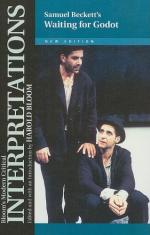|
This section contains 2,671 words (approx. 9 pages at 300 words per page) |

|
Samuel Beckett's fictional world, especially Watt, contains a quasi-Rabelaisian parody of all the rhetorical and logical devices that have permitted Western man, like Beckett's Ubu-esque creation, the "man-pot" Mahood, to hold a "partially waterproof tarpaulin" over his skull. Describing, reasoning, discussing, examining—Beckett's characters never tire of these activities, though no two of them proceed in exactly the same way. They share our "deplorable mania" not only for "when something happens wanting to know what" but furthermore for wanting, like Watt, to know why. Beckett is thus something of a contemporary Faust who, through the agency of his characters, indiscriminately, and with ferocious humor, undermines all our past and present attempts to give reality an intelligible structure, to "think out" our human situation. (p. 74)
Like Joyce, perhaps still more than Joyce, Beckett seems marked by the scholasticism of his philosophy classes at Trinity College. We can find many...
|
This section contains 2,671 words (approx. 9 pages at 300 words per page) |

|


